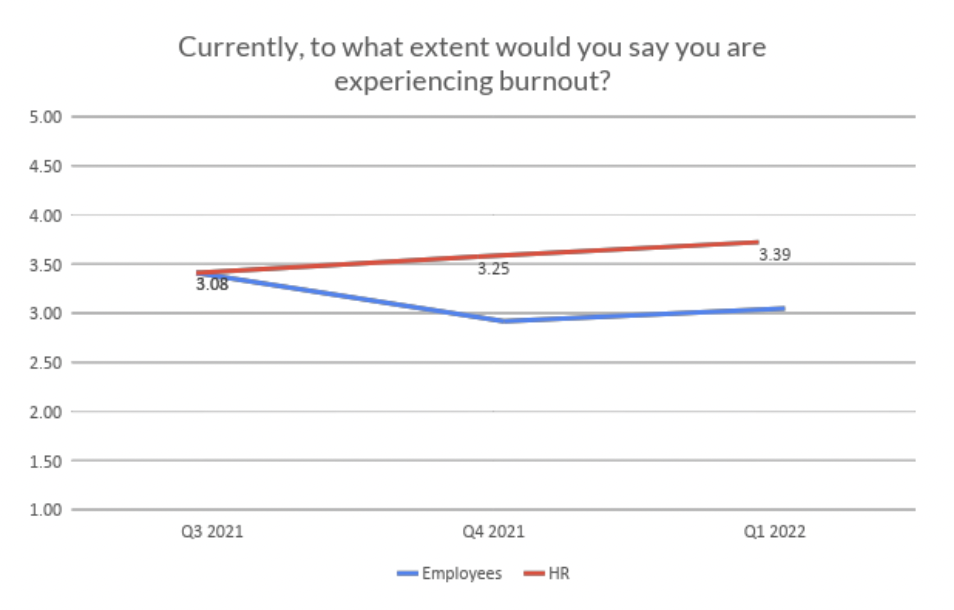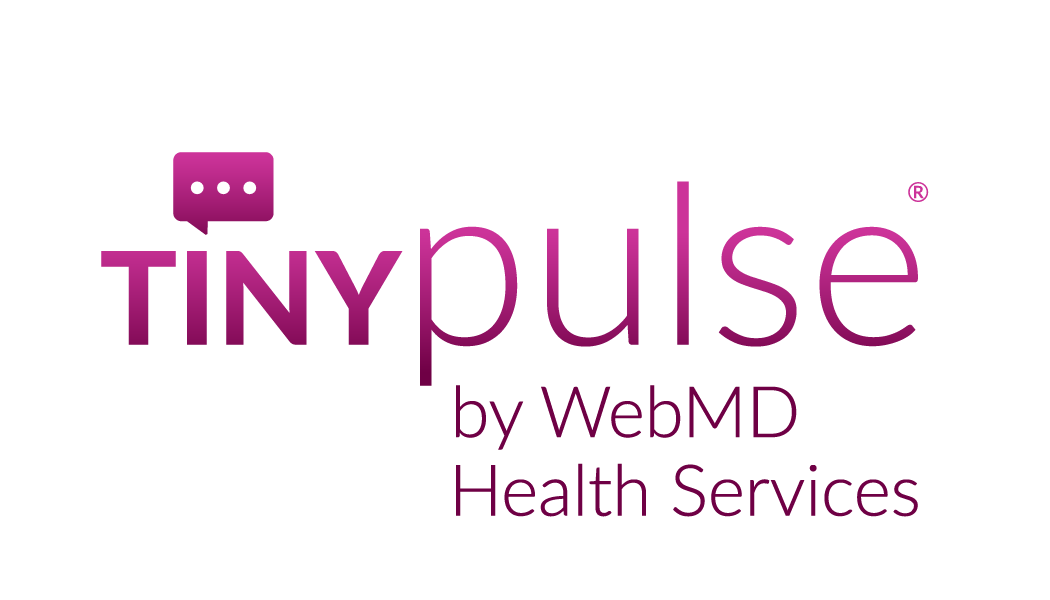HR Teams Don't Need A Vacation, They Need Help.
.jpg?width=2119&name=GettyImages-1170692917%20(1).jpg)
If you work in HR, there is a high probability you read the title of this blog and thought to yourself, "Well, it's about time!". The human resources department has been under a lot of pressure and responsibility (more than usual) for multiple years in a row now due to the state of today's workforce.
Research by TINYpulse states that burnout and empathy fatigue have stayed at high levels for HR and business leaders compared to employees from Q4 2021 to Q1 2022. Burnout for HR specifically demonstrated a consistent upward trend since we began measuring in Q3 2021.

Source: TINYpulse State of Employee Engagement Q1 2022
Typically articles like this are for you, the HR team member or business leader, as the audience to provide tips and insight on how to improve your employees experience at work (burnout, engagement, experience, etc). But today, we're flipping that narrative on its head. HR teams are and have been under tremendous pressure and need something to change. Right now organizations are at risk of higher levels of turnover from their HR departments due to burnout.
We have designed the rest of this blog to provide tips and strategies for HR teams (you) to support HR teams (yes, you!) to decrease burnout and emotional exhaustion in the workplace. To gain a full picture of the landscape we're dealing with, let's start at the beginning.
The correlation between workplace stress and burnout is well-established, but this doesn't mean that the two are synonymous. The term "burnout" is a feeling of exhaustion and an overall sense of apathy toward your job. Burnout is much more than just having a bad day at work or not wanting to begin the next item on your to-do list. It's a serious condition that can lead to chronic health problems if ignored.
What is burnout?
Burnout is a state of physical, emotional, and mental exhaustion caused by prolonged stress. It's a form of stress that occurs when you go beyond your natural ability to cope with the demands of your work or daily life.
What is empathy fatigue?
Empathy fatigue occurs when a person experiences emotional exhaustion and reduced empathy after prolonged exposure to emotional demands from others.
The resulting feeling of being overwhelmed and worn out can lead to withdrawal from others (often in the form of irritability), or even a desire to quit your job altogether. People who are burnt out may still feel satisfied with their jobs; they just don't feel as if they have enough time to do it all.
How does burnout affect HR teams and business leaders?
The effects of burnout on work are wide-ranging and can be seen in several different ways, including absenteeism and poor performance. If an employee is experiencing burnout, they might begin to take more days off from work or call out sick at the last minute. Considering HR's crucial role in organizations, this can wreak havoc on a company's ability to attract and retain top talent.
Burnout also impacts how you perform at work. An employee who isn’t motivated by their job may not do as well as they could have done otherwise, which means that they need help getting back on track when they return from their leave of absence or fill in for someone else while they're away. Not only does this affect morale within your company—as colleagues support each other but also see others struggling—but it also affects productivity throughout all departments and levels across your workplace. HR teams are at the front lines when it comes to employee experience. If the HR team is experiencing burnout, they will not be able to onboard new employees and/or train employees to perform at their highest level.
Burnout and emotional exhaustion
Burnout and emotional exhaustion are two different things. Burnout is a state of physical, mental, and emotional exhaustion that can result from long-term stress. It's typically characterized by feelings of being emotionally drained and physically exhausted. Emotional exhaustion is similar to burnout in that it involves feeling emotionally drained or exhausted as well as having low motivation, but it does not involve an overall sense of being worn out as burnout does.
Emotional exhaustion can lead to burnout if you don't take care of yourself properly when your energy levels are low. Similarly, if you're already experiencing chronic stress (such as from demanding work), a little bit of extra stress could push you over into full-on burnout — which would then cause even more emotional exhaustion! So while there may be some overlap between the two concepts at first glance, it's important to remember that they're not exactly synonymous with one another. Their symptoms vary slightly depending on what stage they're occurring during — and knowing which stage will help explain why certain treatments work better than others in combating both conditions!
Burnout HR teams don't just need a vacation -- they need help.
If you're suffering from emotional exhaustion and burnout, don't try to tough it out. It's not a sign of weakness and it's definitely not something you should be ashamed of. If you're experiencing symptoms of burnout, there are ways to help yourself get back on track and prevent future problems.
What can we do about increasing levels of burnout and emotional exhaustion among our HR teams?
Key Takeaways:
- HR teams need a strategy and support to implement that strategy to improve employee engagement and well-being so they are not overwhelmed
- Prioritize your mental health
- Prioritize your physical health (exercise, nutrition, sleep, etc.)
- Be transparent about the state you're in and what you need to recover
- Use PTO: Take time off from work when possible -- even just for a weekend day or two -- so that your body has time to recover from the physical effects of stress and emotional exhaustion.
- Infuse Wellbeing into the flow of work: organizations should encourage employees including HR to support their own well-being through various initiatives and services offered
Conclusion
Burnout is a serious problem that can have a huge impact on company culture and the success of an organization. If you’re hearing and seeing employees (on HR teams or otherwise) in your organization (or you, yourself) are constantly stressed out, exhausted, and unable to cope with the demands of your job, it's time to implement something to help solve this problem and make a change.
Fortunately, the more you open lines of communication, hear what employees are saying, and act on it, the closer you get to improving overall employee experience, engagement, and decreasing levels of burnout across all teams. Every employee (including HR and C-suite members) deserve to live an emotionally healthy life without having to sacrifice their career goals or personal well-being by burning the candle at both ends.
Share this
You May Also Like
These Related Stories

The Key to Unlocking True Employee Engagement

33 Trust-Building Questions to Ask Your Employees


.png?width=534&height=632&name=blog%20ad%20(1).png)
